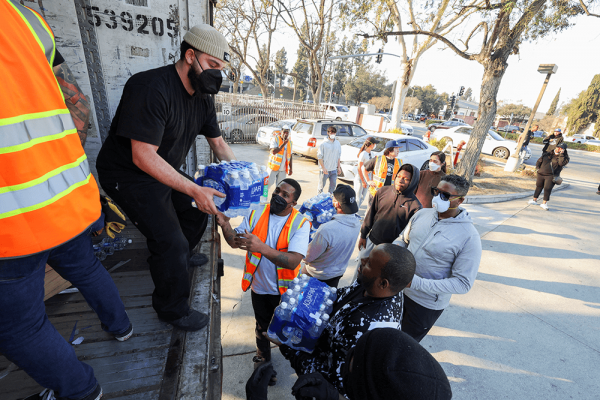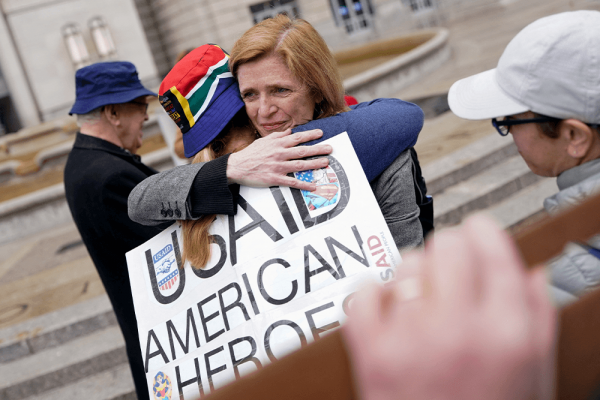While millions have fled Ukraine as Russia invades, the U.S. attitude for accepting Ukrainian refugees has been largely positive.
U.S. leaders have said the country is ready to welcome Ukrainians seeking refuge here and nearly seven in 10 Americans favor accepting thousands of refugees from Ukraine.
Matthew Soerens, the U.S. director of church mobilization for World Relief, told Sojourners he’s seen the United States show an “incredible position of solidarity with the people of Ukraine” over the last month. But refugees from other conflicts, like in Syria or Central America, have often encountered a colder reception, according to Soerens and other immigrant advocates.
“What is troubling to me, and unsettling, is the fact that this sort of worldwide outpouring of empathy isn't there in other situations that are very similar,” Karen González, an author and immigrant advocate, told Sojourners.
Out of 10 million who have fled their homes since Russia launched its attack on Feb. 24, about a third have left the country entirely, according to the Washington Post. They’re overwhelmingly headed for Poland, where more than 2 million refugees have now taken shelter.
Few Ukrainian refugees have ended up in the United States in past conflicts, partly because they’re often able to find safety nearer their homeland, Soerens said. Department of Homeland Security data show that a few thousand Ukrainians are admitted into the United States each year as refugees.
World Relief, an evangelical Christian humanitarian organization, has been responsible for resettling 38 percent of the Ukrainian refugees who entered the United States over the last decade, according to Soerens. He added that many have come because they are persecuted religious minorities, “primarily evangelical Christian or Jewish.”
Refugee resettlement includes a robust vetting process that begins outside U.S. borders. It also takes years, so it’s too early in the crisis to describe the U.S. response to Ukrainians as a refugee-friendly policy, Soerens said.
For Ukrainians who manage to make it to U.S. soil in the coming weeks — such as by showing up at a border crossing — may instead be classified as asylum-seekers. As such, they would be able to wait in the U.S. while officials determine whether they have a “credible fear of persecution or torture” on account of race, religion, nationality, political opinion, or being part of a particular social group.
However, asylum-seekers can be subject to detention and expulsion without due process under section 265 of Title 42, an immigration policy purportedly designed to prevent the spread of COVID-19. The policy began under former President Donald Trump and has been continued under President Joe Biden, though the administration stopped expelling unaccompanied minors in January 2021.
Erika Pinheiro, litigation and policy director for Al Otro Lado, an advocacy group that supports refugees, deportees, and other migrants at the U.S.-Mexico border, told a CBS affiliate there seemed to be no rationale for whether Ukrainian and Russian immigrants are allowed in or turned away at the Tijuana-San Ysidro border.
Soerens said World Relief’s position “has never been that everyone who shows up at the border should be allowed in,” but that people requesting asylum ought to be welcomed.
“We are still essentially ignoring our own asylum laws for Central Americans and for others,” Soerens said. Some Ukrainians have also been turned away, but after media attention, border officials were told they could exempt Ukrainians from being denied entry under Title 42.
“If you have to make exceptions, that speaks to the reality that this rule is not working very well,” Soerens said. “And frankly, we shouldn’t be making exceptions based on ethnicity or religion or skin color or country of origin.”
When Russian intervention in the Syrian civil war in 2015 amounted to war crimes, the U.S. public was initially welcoming toward Syrian refugees — much like it is now toward Ukrainians, Soerens said. The Obama administration moved to increase the number of Syrians resettled in the U.S.
But public opinion turned after November 2015 terrorist attacks in Paris, Soerens said. Many believed Syrian immigrants had been involved. They were not.
Within days, 30 U.S. governors tried to ban Syrians from resettling in their states, arguing that the country could be admitting terrorists among the refugees. Data shows that no refugee — from Syria or anywhere else — has been connected to a terrorist attack in the United States since the Refugee Act of 1980 set up current U.S. procedures for accepting refugees.
“It does sort of break my heart that that we didn’t universally welcome the Syrians who fled literally the same bombs from the Russian government in 2015 and 2016,” Soerens said. “Everywhere we were resettling Syrian families, there was a mixed welcome … We had politicians saying we had no idea who these people are,” despite extensive background checks built into the refugee resettlement process.
Political action soon followed public opinion. In early 2017, Trump signed an executive order instituting an indefinite ban on refugees and other immigrants from Syria and six other majority-Muslim countries. The ban would remain in place for weeks before a federal district court blocked it.
González said U.S. Christians became less receptive to refugees after the Trump adminstration, a response mirrored that of the general public, though both softened on immigration as time went on. Soerens hesitated to guess why U.S. Christians weren’t as motivated to welcome refugees from Syria or elsewhere as they have been to welcome Ukrainians. But González spoke bluntly.
“I hate to be cynical about it, but it’s difficult not to be, honestly, to not recognize that there’s a racial component at play here,” González said. “I think xenophobia and racism are two sides of the same coin.”
She said she recently saw a Christian share the story on social media of an 11-year-old who fled Ukraine with only his passport and a plastic bag.
“People are saying what a hero he is, just incredible,” González said. “There are children in Central America who have made the exact same journey. And they’re put in detention. Nobody hails them as heroes for seeking freedom and safety and security, even though that’s what they’re looking for, too.”
Got something to say about what you're reading? We value your feedback!







